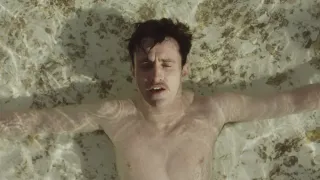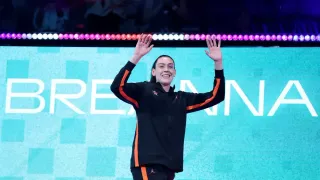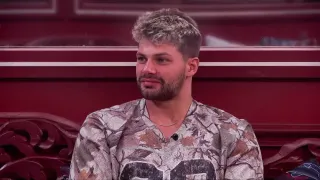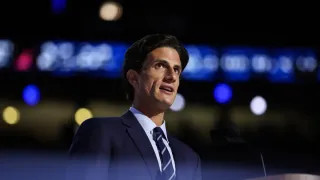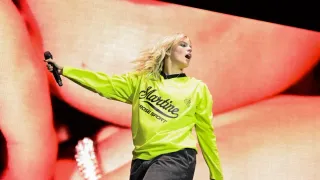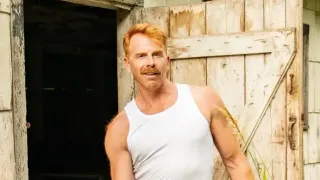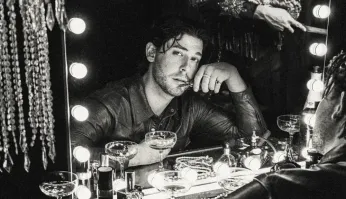
Jul 24
EDGE Interview: Sam Williams Writes His Own Legacy on ‘Countrystar’: ‘Sounding Like Everyone Else Would Be the Death of Me’
Ryan Reichard READ TIME: 7 MIN.
In a genre steeped in tradition and legacy, Sam Williams continues to carve out a space for himself with emotional candor and sonic unpredictability. The release of his latest album, “Act II: Countrystar” has marked the dramatic peak of his three-act musical journey. From reimagining his grandfather Hank Williams’ classic Honkytonkin’” to the emotional catharsis of “Lose You Too” and sonic fusions on “Fugitive,” Williams is using this chapter in his life to embrace every part of himself. In conversation with EDGE, Williams opens up about his sonic exploration, using videos as a means of storytelling and what it means for to live out loud in a world that doesn’t always make space for artists like him.
EDGE: You've just released “Act II: Countrystar,” the emotional and sonic climax of your three-act trilogy. What does this chapter represent for you personally and artistically?
Sam Williams: I think it represents an acceptance of all the different parts of me - my family background, the music I love, the climate we live in, and being gay. I can make all kinds of music, and it was fun to create a project that feels like me, front to back. I can rap, I can sing, I can deliver a ballad that makes you think and feel. I really enjoy flexing that versatility.
EDGE: From “Scarlet Lonesome” to “Countrystar,” how has your perspective shifted between Acts I and II? What emotional journey are you taking listeners on through the trilogy?
Williams: Well, I think Act I centers around love and the fear of losing it - or not finding it - and the uncertainty of what comes next. It explores fear of the unknown in a way. Act II, on the other hand, leans more into hope. It’s the climax and captures the chaos of finding yourself. I think Act I asks questions that Act II begins to answer. There are even some songs on Act II that are lovey-dovey, which isn't always the headspace I’m in. A lot of my music has dealt with pain, and there’s still pain in Act II - but there’s also wonder and joy. It represents a kind of doubling down on who I am. For the listener, I want every song to feel distinct. I love that Act II is a little chaotic, but in a way that still feels cohesive because my voice and story carry it through.
EDGE: “Honkytonkin’” is such a powerful full-circle moment, reimagining your grandfather Hank Williams’ classic. What was going through your mind as you reinterpreted that iconic track?
Williams: This one was more trial and error than most songs I write. The first verse didn’t work, and the tempo changed a few times before I found the right balance - something melodic and rap-influenced, but still tied together with pedal steel and nods to the past. It’s one of my first songs centered around fun and celebration, and I think that comes through in the energy. I got to be playful - sneaking in references like Matthew McConaughey and Phantom of the Opera. With 'Honkytonkin',' the first priority was making sure I could use the sample of his [Hank Williams’] voice - I wanted to turn it into something completely new. The original ‘Honkytonkin’ was about going out, spending money and having a good time, and I wanted to do that in a way that felt modern and fun to me. I love referencing other people's music when I’m creating; there’s something powerful about how a line lands, asks a question, sparks a feeling, or even how it doesn’t make sense in the most perfect way.
EDGE: Tracks like “Lose You Too” radiate a sense of raw heartbreak but also hints of confidence. Did making this album help you find more clarity and comfort in your identity as a gay man in country music?
Williams: I think I’ve definitely gained more confidence. 'Lose You Two' is a sad song. - it just has a happy sound to it. But underneath, it's undeniably sad. I shaped the record to sound that way intentionally, like saying, 'It’s okay for it to be a sad song.' A lot of people feel this way about someone - maybe even right now, maybe always. And yeah, I had to let the sad boy vibes have their moment.
EDGE: Has this new music helped you to process some of those emotions you had while making “Countrystar” and get to a better place?
Williams: "Lose You Two” is a song I've had for a couple years that never quite had a home - it leaned so pop that I wasn’t sure where it fit. Looking back at when I wrote it, and everything I’ve released and lived through since, I’m proud of the way I can talk about where I’m at now. Things change, and my music evolves with that. One day I might write something that feels like my older stuff, like 'The World: Alone,' and the next day it’s a full-on “Fugitive” vibe - maybe even while listening to Beyoncé on the way to write a sad song. I guess I never really know what's coming, but “Lose You Two” hits closest to my heartstrings on this album. No matter how my sound shifts or where my career goes, my music will always stay rooted in real emotion - because that’s how people connect.
EDGE: You hosted a release party at The Nashville Palace and even led a line dance to “Honkytonkin’.” What was that experience like, and how important is movement and visual storytelling to your music now?
Williams: I love when visual storytelling becomes part of my music. It’s definitely a challenge to pull everything together, but I’m a visual learner, so it’s something I’m drawn to. I’ve never danced before, really, so learning the choreography for “Honkytonkin’' has been a totally new experience - but a fun one. I’m actually filming the video today, which is exciting! I’m grateful the song has such a happy vibe, because in this self-promotional world, it’s hard to show up when you’re not feeling it. But this one makes it easier. I think it’s going to be a really incredible video - the big one from this era.
EDGE: The trilogy of albums so far as a whole seems to wrestle with themes of fear, love, identity and legacy. What’s been the hardest part of sharing that vulnerability, and what’s been the most rewarding?
Williams: The hardest part is having to own the hard times. I have a song called “Heartbreak in the Open” that’s not out yet, and it’s about being exposed - sharing your dreams and your heartbreak with the world. That’s just how it is for some people. You end up letting others witness you breaking, failing, succeeding and inspiring. Owning those hard times isn’t fun, but what’s rewarding about my music is that it often doesn’t make sense to me while I’m creating it. Then I look back and - even if the big break hasn’t happened yet - it all starts to make sense. It looks like a real journey, one that was meant to unfold. It definitely doesn’t always feel that way in the moment - it doesn’t feel like that today. Honestly, I have no idea what the hell I’m doing, but I’m doing something. That’s just who I’ve always been. What truly makes it worthwhile is seeing real love in real life from people. I had an amazing show last night, and that connection - that moment where you see people believing in you and believing in themselves too - that’s the part that means everything.
EDGE: With Act II now out in the world, what can we expect from Act III? Will it be a resolution, a continuation, or a surprise altogether?
Williams: I wouldn’t say it’s entirely new, but as my music evolves, I’m always bringing something fresh. Act III has more resolve - it’s softer than Act II. I feel like I’ve continued to find my sound and deepen the story. Act II was more about manifesting, putting things out into the world. You hear a bit of the Justin Bieber and Justin Timberlake influence there. But in Act III, there’s more of the Chris Isaak and Hozier side of me - a part that's more at peace.
EDGE: You’ve carved out a space that honors your lineage while fearlessly forging your own path. What do you hope people remember most about this era of your music?
Williams: I just hope people recognize that I’m different. I’m not chasing trends or trying to go viral - I’m making music that’s rooted in story. Sure, some of it might sound bigger or more commercial now, but I don’t make music just to play around. I make music because it matters to me, and I’m good at it. I didn’t wake up one day, decide to become a country singer, and move to Nashville just to cash in on followers - that’s not who I am. I want people to feel something when they hear my songs. I want them to believe in their past, their future. That’s what I always admired in the artists I looked up to - like Miley Cyrus and Nicki Minaj. Being diverse in your expression matters. Honestly, even if I wasn’t gay, my music would still be wild.
EDGE: You mentioned Miley Cyrus; have you heard her new album and who are some of the artists you’re listening to right now?
Williams: Miley’s in a league of her own - she’s innovative, unapologetically herself and not chasing trends. Her work reflects her life, and that’s what makes it so powerful. I absolutely love her. I also love Jessie Murph - her new album dropped today and she’s seriously dominating. She’s a monster talent. I tried to get her on a track for Act II, but it didn’t happen yet. Hopefully soon. Right now, I’ve got her album on repeat, along with some classic Chris Brown and a bunch of wild YouTube mixes.
EDGE: I think that is why I have always been drawn to your music; it mixes some of the old sounds with some new ones. You know?
Williams: Yeah, it just be that way sometimes. I know I naturally lean toward the abstract - darker, left-of-center stuff - and I have to pull myself back and be like, ‘Alright, not everybody needs all that all the time. It’s okay, bro.’ That’s been a bit of a journey, honestly. I’m not the best at reigning it in, but I am good at thinking outside the box. Lately, I’ve really embraced honesty in my work. And I’ve had so much fun rapping - I didn’t expect that at all. Some of my friends in high school thought I’d become a rapper, but I never went down that path… until it just happened. People saw it and said, ‘This is you. You’re doing it, and it’s good.’ I’m just happy to be making something different. Sounding like everyone else would be the death of me.
